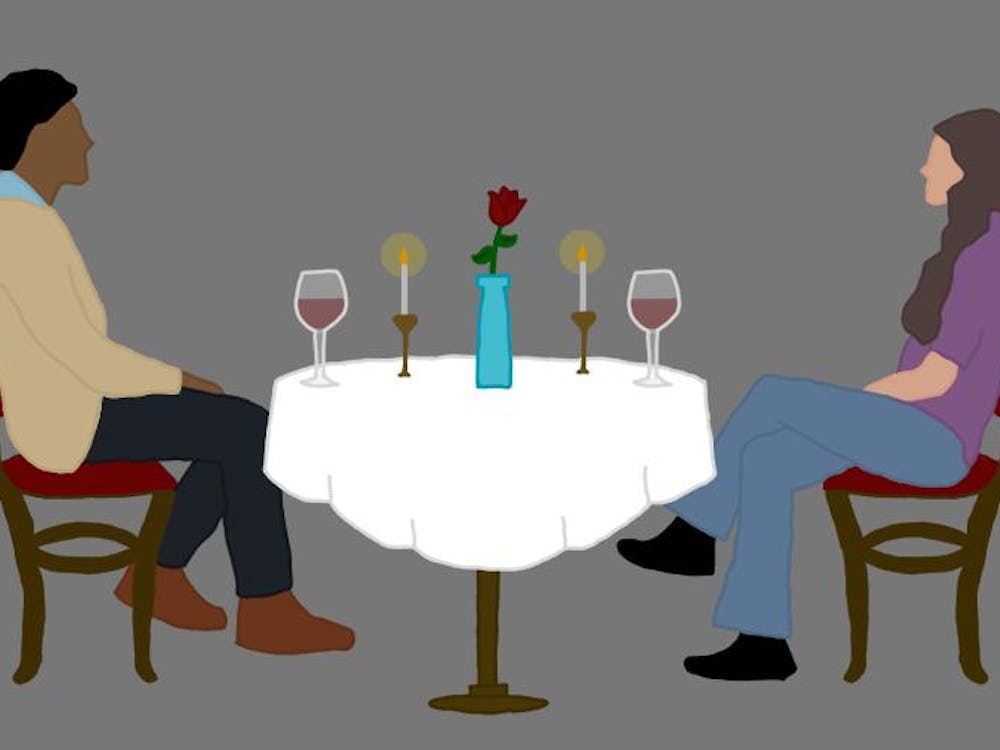What would you sacrifice for a cause you believe in? You may think you're passionate about it, but how far are you willing to go to prove it? Would you join an organization? Protest? Encircle your body with chains and attempt to lock yourself to a banister in the Rotunda?
Graduate student Rich Felker has done all three to show his support for Tibet. Last Thursday, the University Judiciary Committee found Rich guilty of intentional disruption of a University activity and failure to comply with University officials for attempting to lock himself to a banister in the Dome Room of the Rotunda during a speech by Chinese Ambassador Yang Jiech.
In addition to receiving 20 hours of community service for his protest last June, Rich also was sentenced to "suspension in abeyance," meaning that if he is convicted of a repeat offense by UJC, his suspension will be recommended, a punishment Rich said is particularly bothersome.
"The message is very clear," he said. "If you dare to speak out politically in a creative and confrontational way again, we're going to see that you're suspended."
Rich said this strong statement from UJC will not serve as a deterrent in his future efforts, and he would be willing to risk suspension.
"I'm dedicated to advancing this cause nonviolently, whatever cost is necessary," he said. "However, I am deeply concerned that it could discourage students in other causes or other students in our own cause not to be as vocal at the University."
Consequently, he said he felt the University's priorities are questionable.
"UJC and the University are going to stand up for protecting the Chinese government from criticism before they're going to stand up for the rights of their own students," he said.
Fourth-year College student Angela Carrico, the president of UJC, could not be reached for comment by press time.
Although Rich is now extremely active in Students for a Free Tibet at the University and recently became a contact for the region which includes Virginia, Maryland, The District of Columbia and Delaware, he himself is not ethnically Tibetan nor does he have any personal ties to Tibet. In fact, his initial involvement in the movement was somewhat accidental.
"Really what happened when I first came to U.Va. as a transfer student was that I met members of Students for Free Tibet at the student Activities Fair and was very inspired by what they were doing and the message they were giving," he said.
Before becoming an activist for Tibet, Rich said he had a much broader and more general opposition to aspects of Chinese rule.
"I had sort of a longstanding understanding of the political oppression and lack of any individual freedom in the People's Republic of China and was very concerned about that, but didn't really know a lot about Tibet until I met Students for a Free Tibet," he said.
Although he is active in other "human rights campaigns," Rich said there are benefits to focusing on one particular movement.
"What really strikes me about being involved in one particular movement -- the Tibetan movement -- is being able to interact directly with the specific people it involves," he said. "I think that's very hard if you try to be broad about it and try to help everyone at once."
He said personal interaction with the approximately 20 to 30 Tibetans living in Charlottesville makes his participation more meaningful. Also, since he has been unable to visit Tibet, meeting local Tibetans has strengthened his resolve.
"It's readily apparent to me having met people who spent 33 years in prison being suspended from a ceiling over a burning fire, shocked with electrical prods and cuffed with razorblade handcuffs that something is incredibly wrong in Tibet," he said. "You don't have to see this with your own eyes in order to be a supporter."
In the future, he said he would like to make a personal trip to Tibet.
"I do want to see things with my own eyes so I can be a better witness to what's happening and gather more support for the Tibetans," he said.
One of the ways in which Rich attempts to gather support is by increasing membership in Students for a Free Tibet. One of his recruits, third-year College student Steven Felker, is his own brother.
"I had been working my hardest to keep things alive and build the movement here," Rich said. "I think some of that excitement rubbed off on my brother, and I asked him to help me with that and see what we could do."
Steven and fourth-year College student Matt Klein currently serve as two of the three co-coordinators for the group. Both were supportive of Rich's actions but said they were more comfortable with participating in more traditional protests. When Rich attempted to chain himself to the Rotunda, Steven and Klein were protesting outside.
"We were more cautious about it," Klein said. "We weren't ready and willing to start our police record that day."
Although they said the ultimate goal of their organization is to free Tibet from Chinese control, they realize that smaller goals are more realistic.
"I think that ending the occupation of Tibet is a really lofty goal, and that's kind of our central purpose," Steven said. "But at the same time, there are a lot of smaller things we can do to slowly progress to that, like education of the student body and through bringing speakers here."
One of their most dramatic recent efforts was a daily vigil on the Lawn last semester for Tenzin Delek Rinpoche, a Tibetan monk the Chinese government intends to execute at an undisclosed date. Members of the organization wore monks' robes and chains to raise student awareness.
"People were really curious as to what would compel us to sit out there every day in the cold and the rain wearing those chains," Klein said.
Since the monk has not yet been executed, they said they plan to continue the demonstration this semester, expecting the execution date to be in early December.
Although Steven became involved largely through the influence of his brother, Klein said his interest increased after hearing the Dali Lama speak in New York.
"I was inspired to work for the same cause, and I just found some good friends in the club and kept going," he said.
Other members of the University community, however, see the situation in Tibet differently.
Third-year College student Greg Saari, who currently is the president of the Chinese Student Association, felt so strongly about Rich's protest last year that he wrote a letter to the editor expressing his disapproval. Although Saari said he recognizes the strong controversy surrounding the subject, Rich's actions were inappropriate.
"What he did during the ambassador's talk showed a lack of class and a lack of respect for the University as a whole," he said. "I mean, yes, he is very passionate about his cause, but that was not an excuse for how he treated the ambassador and the impression the ambassador now has of the University."
Since the Chinese ambassador had not come to discuss Tibet, Saari said Rich's "attack" was unwarranted and disgraceful.
"I feel like this man shamed the University on an international scale," Saari said. "He shamed the University in front of China, and that was not acceptable."
Consequently, Saari said UJC's action was appropriate.
"I would hate to see him expelled or anything like that, but I think that some kind of action should be taken because he did make a fool of himself and the University," Saari said. "He took himself out of the personal realm and forced it on the public."
Saari is not ethnically Chinese, but he said he has been involved in Chinese political and cultural activities for several years. Although CSA has no official stance on Tibet, Saari said that his studies and time in China have shaped his own personal opinion on the subject.
"The free Tibet movement in the United States is so full of propaganda from both sides that it is hard to see the real issues," he said, specifically mentioning the Chinese government and the Dali Lama as responsible for what he views as misinformation.
Saari said Tibet has taken the limelight because wealthy, ruling Tibetans were exiled. He said the Tibetan people were not the only ones to suffer under the Chinese Cultural Revolution.
"The Tibet issue, at least as far as I see it, falls under a completely separate issue," Saari said. "It's not an issue of human rights. Yes, it is true that Tibet is pretty much a third-world country, but China is a third-world country, too."
He said he is frustrated by the inconsistencies of human rights activists.
"What just makes me angry is that, yes, a lot of Tibetan people suffer, but a lot of Western Chinese people do, too," he said. "But the way the Dali Lama talks, he's demonizing China. That kind of propaganda is what the West has been fed for the last several years."
He said it would be extremely difficult and unlikely for China to create Tibet as a separate entity.
"To the Chinese traditional mindset, Tibet has been part of China but was separated culturally," he said. "There was never really territorial independence to begin with. It's an issue of cultural and territorial homogeneity. To give up Tibet would make China lose face in the international community"






